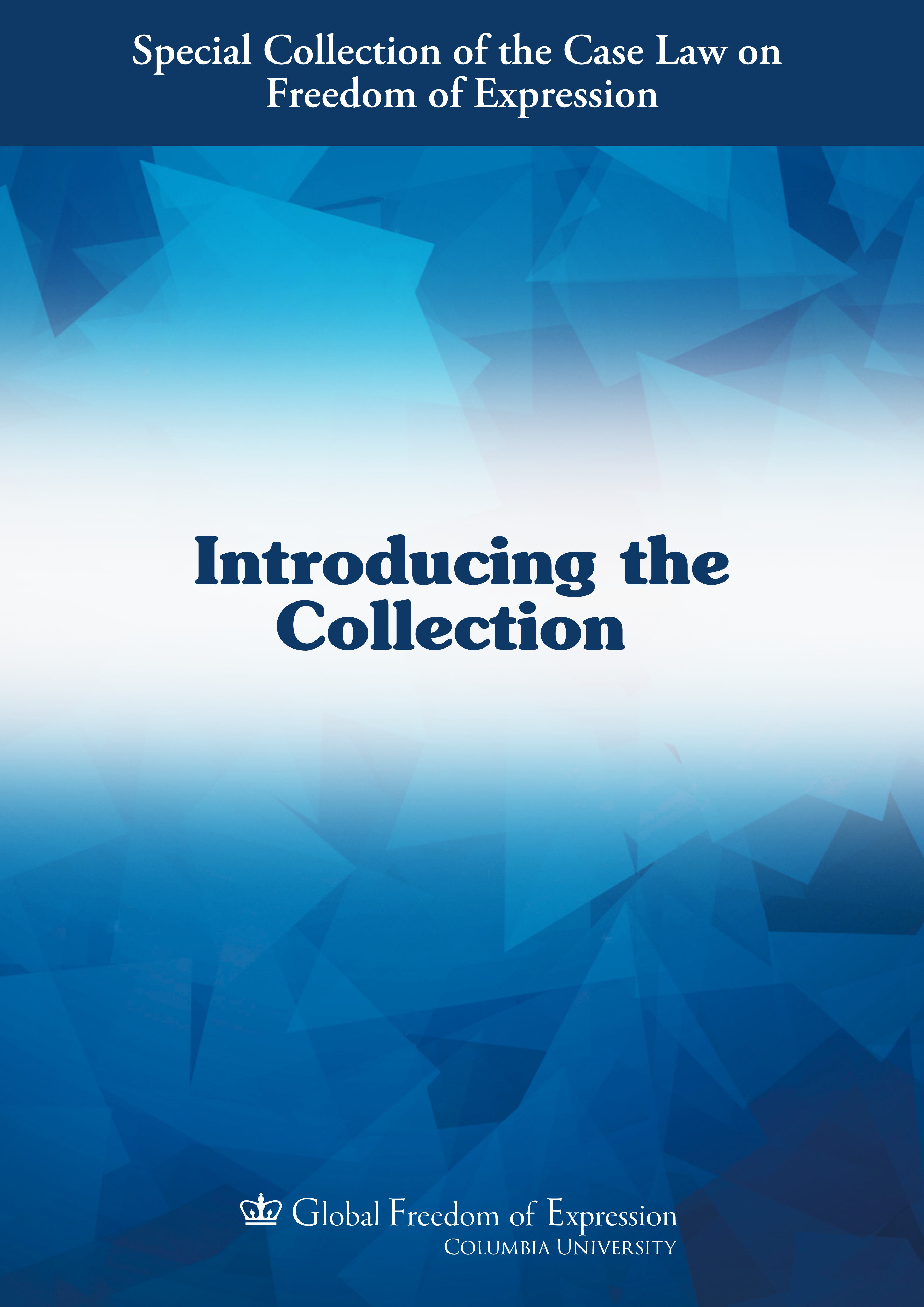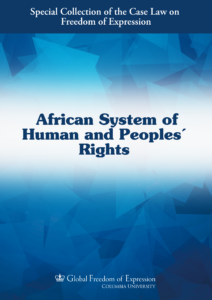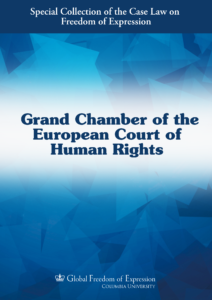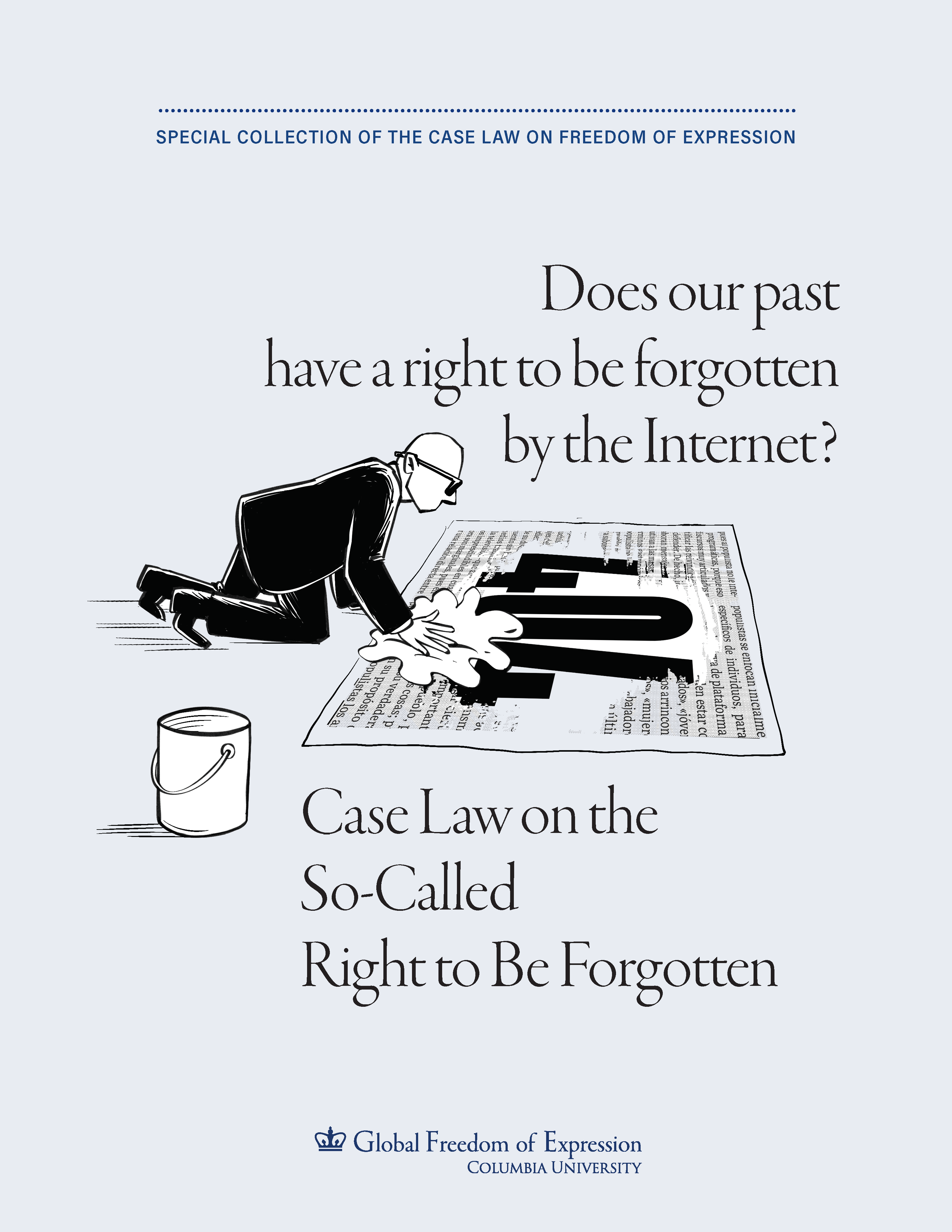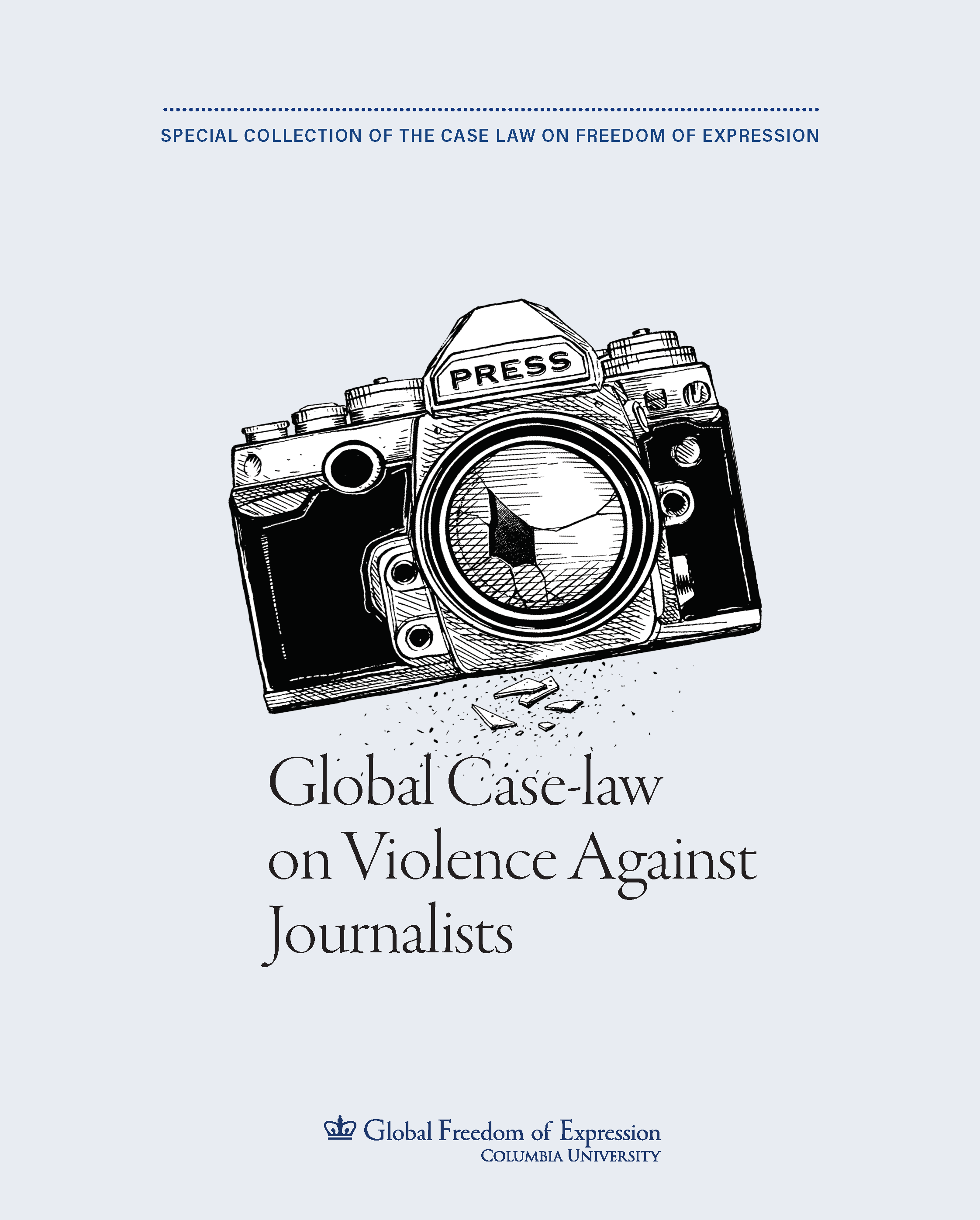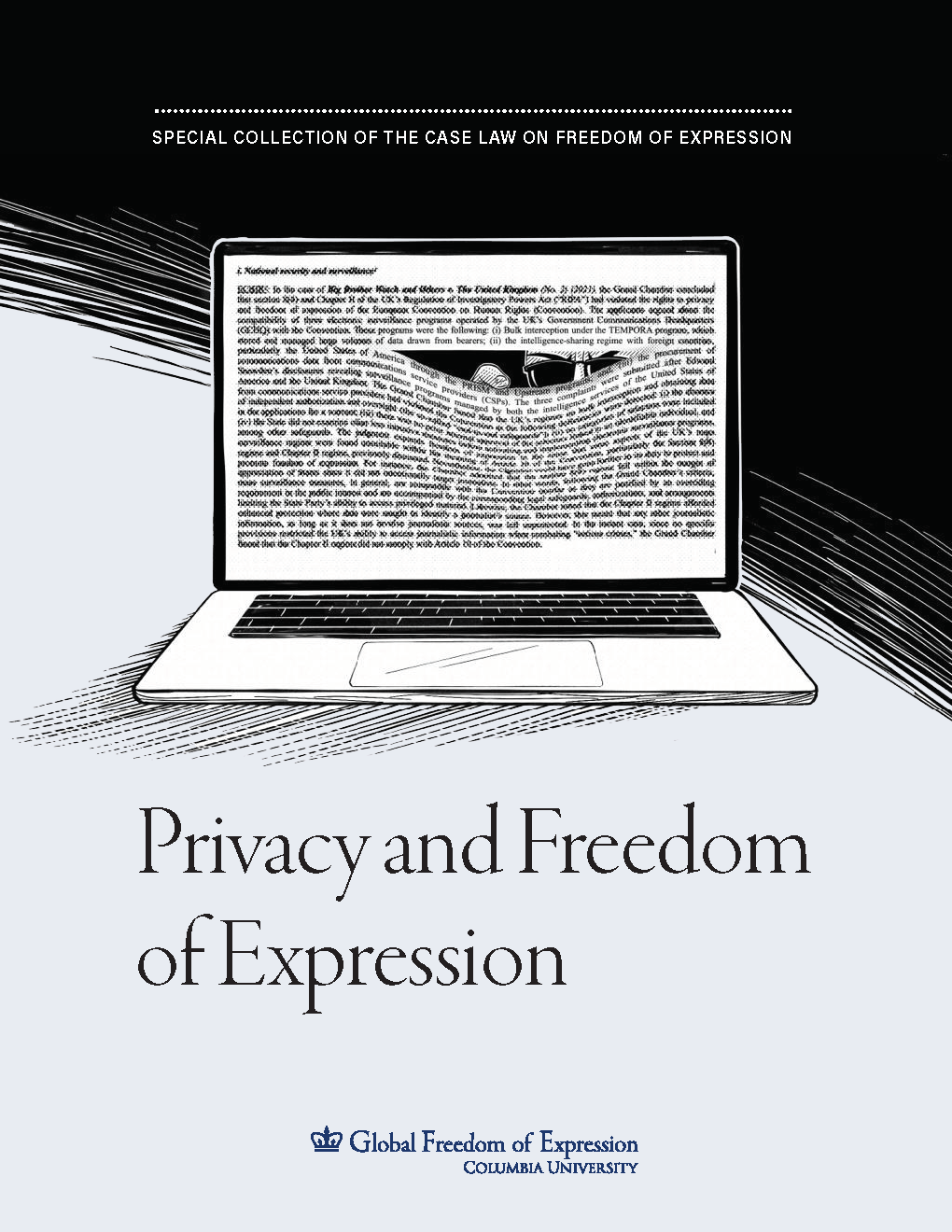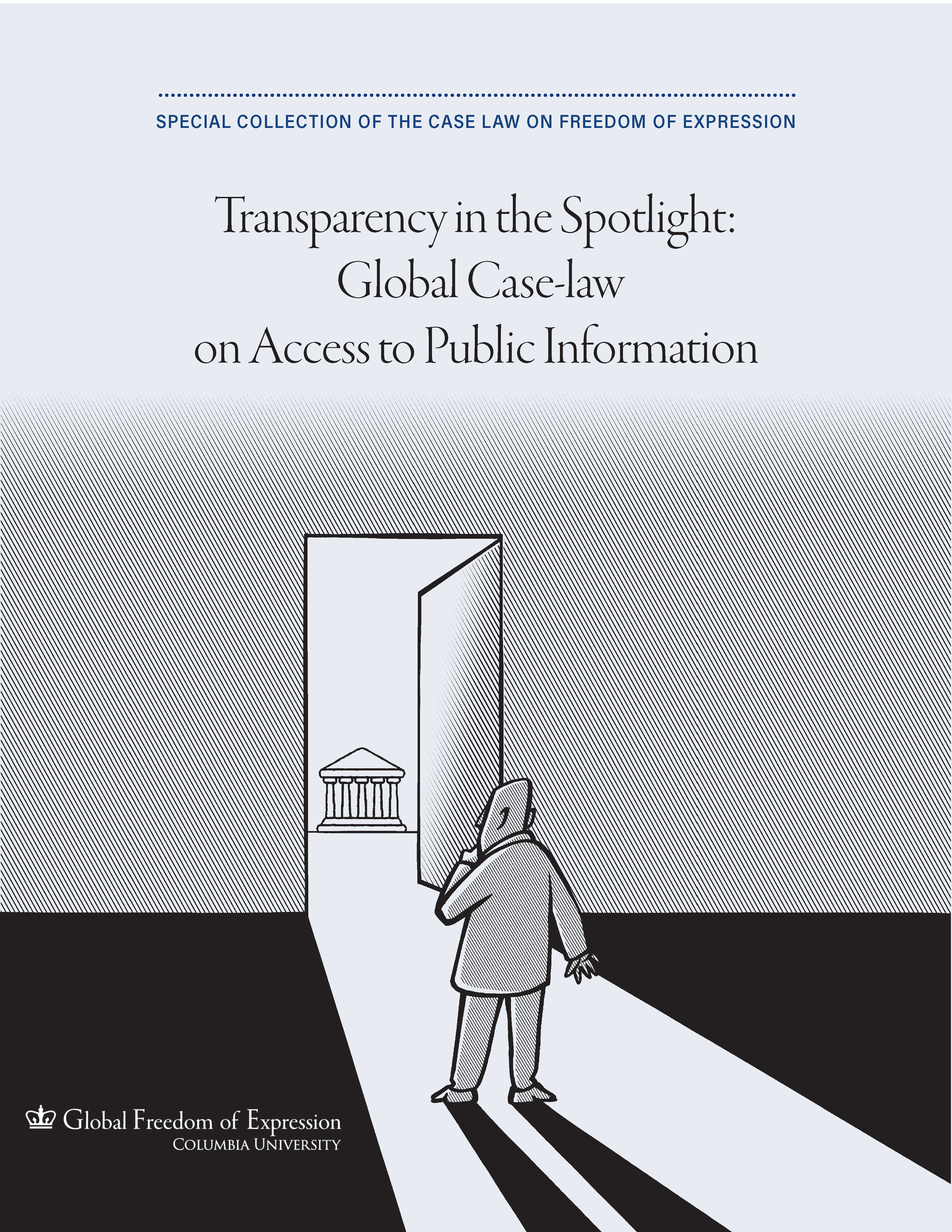Special Collection of the Case Law on Freedom of Expression

The Global Freedom of Expression Special Collection of the case law on freedom of expression is a series of publications, which aims to provide a global outlook of some of the most significant legal decisions adopted by national and international tribunals on relevant topics regarding freedom of expression. The collection is based on judgments incorporated into the Global Freedom of Expression Case Law Database. Columbia Global Freedom of Expression, an initiative of Columbia University President Lee C. Bollinger, seeks to contribute to the development of an integrated and progressive jurisprudence and to advance understanding of the norms and institutions that best protect the free flow of information and expression.
Special Collection on the Case Law on Freedom of Expression: Introducing the Collection
The first three publications showcase the case law of the regional human rights tribunals. Indeed, in these publications, the readership will find systematized summaries of decisions on freedom of expression of the Inter-American System of Human Rights, the African System of Human and Peoples’ Rights, and the Grand Chamber of the European Court of Human Rights. The remaining documents focus on case law from courts and other non-judicial actors regarding some of today’s most challenging or emblematic freedom of expression issues. The topics have been selected as a result of global and regional trends identified by the experts of the Columbia Global Freedom of Expression initiative. In the collection, the reader will find, on the one hand, the systematization of decisions on classic tensions that continue to raise complex problems for judicial operators, such as the tension between the right to privacy and freedom of expression. On the other hand, the collection seeks to systematize the most emblematic cases on issues that present new challenges for judicial and extrajudicial operators, such as online content moderation.
Special Collection on the Case Law on Freedom of Expression: Inter-American System of Human Rights
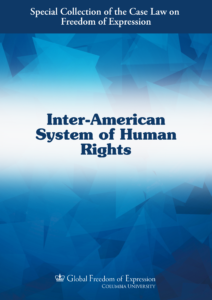 This publication aims to provide an overview of the case law on freedom of expression in the Inter-American System of Human Rights by creating an access tool for anyone interested in consulting the case law. In this paper, the reader will be able to find a general introduction of the structure of the regional system and a systematized description of all the decisions to date of the Inter-American Court of Human Rights regarding freedom of expression, as well as the most relevant cases decided by the Inter-American Commission of Human Rights that did not reach the Court. This paper provides a topical classification of the Inter-American case law on freedom of expression, highlighting the main issues being discussed in the region. The complete analysis of the systematized cases can be found in the Columbia Global Freedom of Expression database in English, accessible directly through this publication. We hope that the collection provides judges, lawyers, academics, civil society, and all key actors with a useful tool for the defense of freedom of expression around the world.
This publication aims to provide an overview of the case law on freedom of expression in the Inter-American System of Human Rights by creating an access tool for anyone interested in consulting the case law. In this paper, the reader will be able to find a general introduction of the structure of the regional system and a systematized description of all the decisions to date of the Inter-American Court of Human Rights regarding freedom of expression, as well as the most relevant cases decided by the Inter-American Commission of Human Rights that did not reach the Court. This paper provides a topical classification of the Inter-American case law on freedom of expression, highlighting the main issues being discussed in the region. The complete analysis of the systematized cases can be found in the Columbia Global Freedom of Expression database in English, accessible directly through this publication. We hope that the collection provides judges, lawyers, academics, civil society, and all key actors with a useful tool for the defense of freedom of expression around the world.
Special Collection on the Case Law on Freedom of Expression: African System of Human and Peoples’ Rights
The current publication provides an overview of the valuable case law developed in the African System of Human and Peoples’ Rights regarding freedom of expression. The paper commences with a brief explanation of the African System of Human and Peoples’ Rights and a concise reference to how the AfCHPR and the ACHPR engage with other decisions of national and International Courts. Finally, the document encompasses both the case law of the African Commission and the African Court of Human and Peoples’ Rights. The summary of the decisions are classified under different themes within freedom of expression to make consultations friendly to all the public. The complete analysis of each case can be found in the Columbia Global Freedom of Expression database in English. The main purpose of the publication is to serve as a tool for everyone working for the defense of freedom of expression by facilitating the access to the cases of the African System of Human and Peoples’ Rights that foster the debate around this fundamental right in the region. We invite readers to use this paper as a tool to access the database and benefit from the analysis therein.
Special Collection on the Case Law on Freedom of Expression: Grand Chamber of the European Court of Human Rights
During the last four decades, the Grand Chamber of the European Court of Human Rights has developed a nurtured case law on freedom of expression. This publication aims to provide an overview of said case law and create a research tool for anyone working for the defense of freedom of expression. The paper commences with a brief explanation of the European Court of Human Rights and concisely references how its jurisprudence engages with the decisions of other national and international Courts. Finally, the document presents the summary of decisions reached by the Grand Chamber, classified under different themes within freedom of expression to make consultations friendly to all the public. The complete analysis of each case can be found in the Columbia Global Freedom of Expression database in English. The main purpose of the publication is to serve as a tool for everyone working for the defense of freedom of expression by facilitating access to the cases of the European System of Human Rights. It is our hope that this paper will be useful for anyone working in the field of freedom of expression.
Special Collection on the Case Law on Freedom of Expression: The Decisions of the Oversight Board from the Perspective of International Human Rights Law
The Oversight Board (OSB) started its operations in 2020, as an initiative of the technology company Meta. Characteristics of the Board include the capacity to have a final say on whether material will be restored to the platform or not, or whether to confirm a decision to leave up a piece of content. The main task of the Board is to assess consistency between content decisions taken by Meta’s platforms, Facebook and Instagram, and their own internal (private) principles and rules. The Board can also make policy recommendations for changes in the way that the company implements its community standards and practices. The paper presents a general overview of the decisions adopted by the OSB since its creation, particularly regarding the use of international human rights to interpret the meaning and scope of Meta’s products’ values and community standards. It provides some critical insights regarding the way that the Board uses international human rights standards originally created to govern the relationship of the individual and the State and reflects on the nuances and adaptations introduced by the OSB when examining selected content moderation decisions. The complete analysis of each case will soon be uploaded to the Columbia Global Freedom of Expression database in English. The main purpose of the publication is to serve as a tool for everyone interested in the challenges associated to the growing phenomenon of respect and application of human rights by private technological companies. It is our hope that this paper will be useful for anyone working in the field of freedom of expression.
Meta’s Oversight Board Cases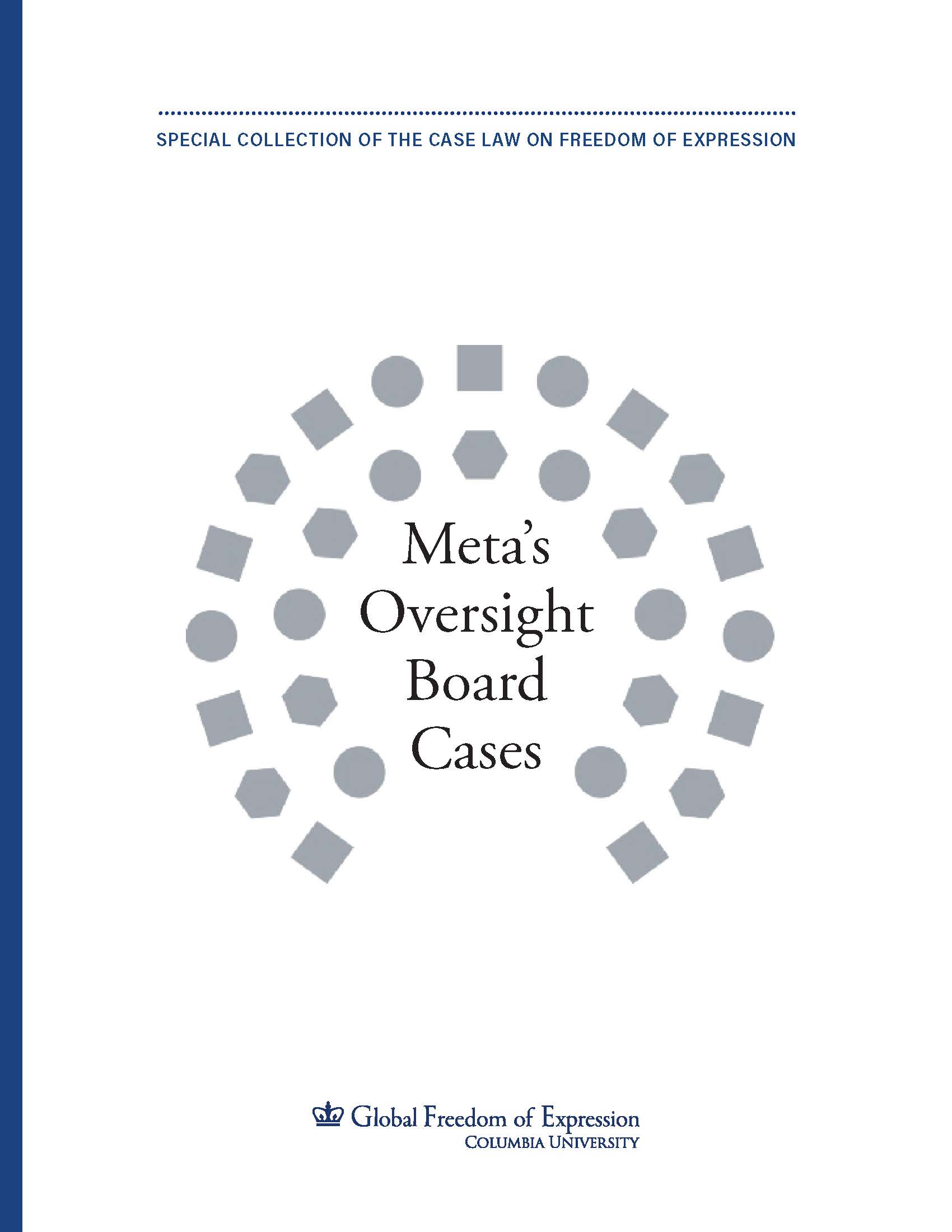
This publication is a companion paper to the above paper on The Decisions of the Oversight Board from the Perspective of International Human Rights Law as part of its Special Collection of Case Law on Freedom of Expression series. The companion paper systematizes all the summaries of the cases from the Oversight Board published before October 31, 2022 and provides a quick reference to the scope of the cases and the relevant findings of the board. The cases are ordered by the relevant Meta’s Community Standard and sub-standard discussed in each decision. The dominant standards at issue in the cases thus far are Hate Speech, Dangerous Individuals and Organizations, and Violence and Incitement. They include a variety of cases including some that address necessary limitations on political speech by politicians, such as in the well-publicized case of Former US President Donald Trump’s suspension, but also cases that recognize the need for consistency in content moderation policies for conflict zones, as well as the need for exceptions to policies in order to uphold international human rights standards, depending on the unique context of each case. At the end of each case summary, there is a link to the database entry of the case which includes a more detailed description of the facts of the case and the Oversight Board’s arguments, a list of references of the international standards and relevant sources cited in the decision, an evaluation of the decision and the link to the original document, among other information.
Does our past have a right to be forgotten by the Internet? Case-law on the So-Called Right to be Forgotten
This latest paper in the Special Collection of Case on Freedom of Expression series shows how judges around the globe are dealing with the challenges posed to the social processes of memory and forgetting on the Internet, by the easy availability of information in perpetuity that was unknown in the previous non-digital era. The report highlights the constitutional challenges of these new rights-claims from the standpoint of freedom of expression, the new grounds that rights-claimants have sought to open and the basis found by judges around the world to dismiss or to accept the petitions based on the so-called right to be forgotten. The paper explores a broad range of court decisions to illustrate the jurisdictional complexities of de-indexing and its transnational impact, as well as courts’ legal reasoning when balancing freedom of expression with privacy, intermediary liability, reputation and the special duties of public figures.
Violence Against Journalists Around the World: An Inquiry Through Case-Law
This Special Collection Paper by Ramiro Álvarez Ugarte documents the findings of a global research project which sought to identify judicial trends in the adjudication of cases involving violence against journalists and human rights defenders. The paper provides an in-depth analysis of 43 court decisions, most handed down over the last five years, that have been added to the Case Law Database relating to this particular form of harm against freedom of expression. The project defined violence against journalists and human rights defenders broadly, including murder, physical aggression, incarceration, threats and other forms of harassment. However, the research also included new forms of violence, such as online harassment and surveillance, especially against women. The first section discusses the conceptual and methodological approach to the research, and the challenges and lessons gathered in the process. The second section introduces the international human rights standards against which judicial trends are, or should be, bench-marked. The third section presents the main findings from the different regions covered, with a focus on the trends identified based on the decisions reviewed. The fourth and final section offers a brief conclusion.
Privacy and Freedom of Expression
The border between a robust exercise of freedom of expression and proper protection of the right to privacy has been a matter of intense judicial scrutiny by numerous courts around the world. Therefore, the purpose of this paper is to present, in a systematic manner, the summaries of some of the landmark decisions from different regional and national jurisdictions that are found in the Columbia Global Freedom of Expression database. It is not meant to be a comprehensive or exhaustive list, nor a comparative study: rather it aims to present the diverse case law of different legal systems about privacy and freedom of expression, their mutually reinforcing relationship, and the tensions that have arisen when these rights collide. The selection of cases was based on whether they conform clearly to global standards and trends; they show the complexity of the tensions to be resolved; or, given their degree of arbitrariness, it is important to highlight them by way of contrast. Cases are further presented in thematic subsections, featuring the broad scope of issues discussed under the privacy/freedom of expression paradigm. The paper serves as an illustrative summary of emblematic decisions that may be of interest to judges, lawyers, and activists.
Transparency in the Spotlight: Global Case-law on Access to Public Information
This paper analyzes the best available case-law on access to public information. We selected more than 100 emblematic cases where judges or specialized bodies granted access to the requested information and applied international human rights standards. Full summaries of these decisions are now available in Columbia Global Freedom of Expression’s database. The paper delves into the specifics of each case while offering a comparative and reasoned perspective of its relevance, in the hope that future legal practitioners can apply these standards when facing similar cases. The second section briefly presents a land-mark case delivered by the Inter-American Court of Human Rights in 2006: Claude Reyes et al. v. Chile, which has set standards in the region. The third section expands on some of the basic human rights standards concerning access to public information and comments on different cases that exemplify each of them. In the fourth section we present how global courts and specialized bodies have balanced the right to access public information with other human rights—such as privacy—or have granted access to information concerning certain topics—such as the environment or Covid-19.
How are courts responding to SLAPPS? Analysis of selected court decisions from across the globe
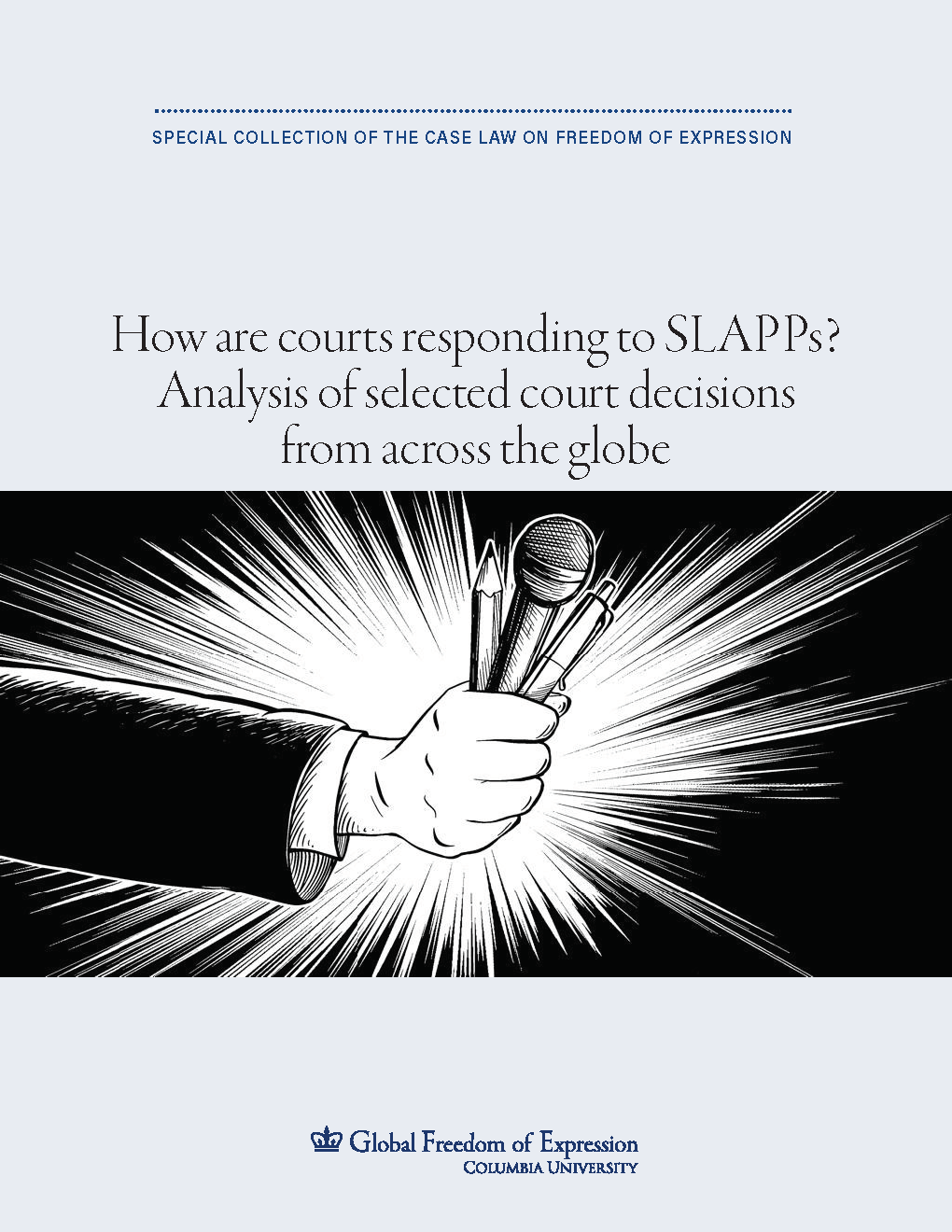
The increase of cases of strategic lawsuits against public participation (SLAPPs) is a growing concern for human rights bodies, the media, and civil society around the world. SLAPPs are a form of abusive litigation that intimidate and harass journalists, media outlets, protesters, or environmental and human rights defenders. These lawsuits are typically initiated by politicians, public officials, wealthy businesspeople, big companies, and public figures aiming to silence critical voices and stifle scrutiny and public debate. This study examines some judicial responses to SLAPPs in a small sample of cases around the world. It looks into whether courts recognise the danger posed by SLAPPs and whether and how they assess SLAPP cases. The study is divided into three sections. First, we provide a brief overview of the concept of SLAPPs and why they are concerning from the perspective of freedom of expression and freedom of the media. Second, we try to deduct some key aspects of judicial responses to SLAPPs in jurisdictions without dedicated anti-SLAPP protection, determine whether these are adequate, and outline what underlying issues need to be addressed to eliminate the problem of SLAPPs. Finally, we offer a conclusion that provides some initial recommendations on how the good practices of courts and existing gaps should be addressed based on international freedom of expression standards.
Internet Shutdowns in International Law
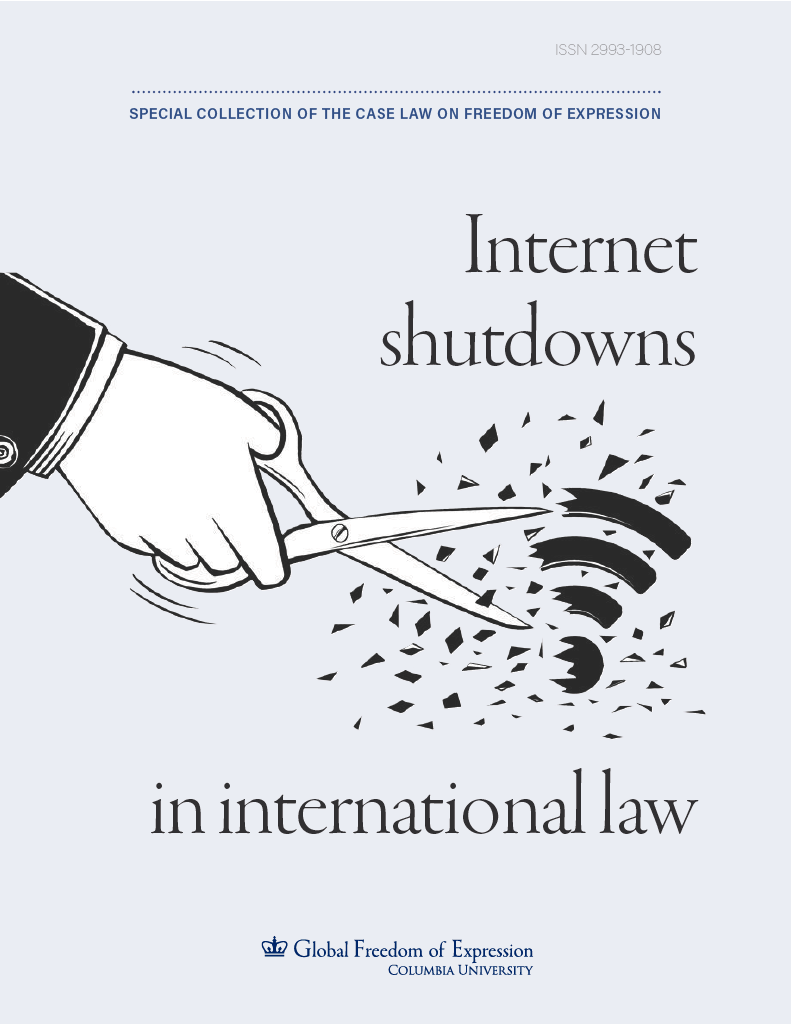
This paper contributes to the discussions surrounding the internet and the challenges of its regulation. It is divided into two parts. Part one documents the international standards that have emerged pertaining to internet shutdowns, and part two explores the relevant case law at the national and international levels. The authors compile and reiterate what has become an international dogma of access to internet being an enabler of human rights. International mandates provide definition of the shutdowns and enumerate their threats to the whole palette of human rights. They draw the line between blanket shutdowns and specific forms of online censorship. Shutdowns are barriers to the universal access to the internet and to sustainable development, they abort freedom of expression and the right of access to information. Nevertheless, States find reasons to introduce internet shutdowns in the name of public interests to protect national security and public order. The paper reflects the international standards on the related modern arguments to justify shutdowns, such as disinformation and propaganda, as well as in situations of an imminent cyberattack from abroad.
Case Law on Peaceful Protests
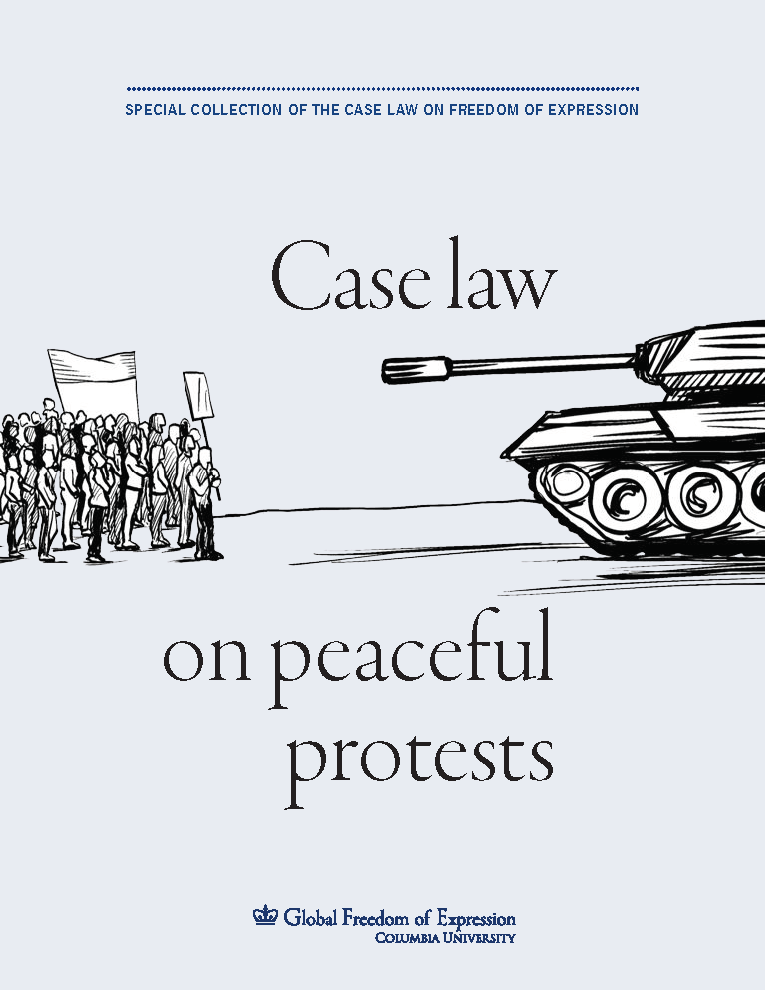
Peaceful protests and demonstrations have always been an essential means of the social, economic, and political transformations that have characterized human history. Recent years have seen a continuous rise in protest movements, with mass demonstrations erupting almost daily worldwide for various causes. Protests are also growing in complexity. Digital technologies have brought enormous opportunities for organizing, participating in, and reporting on protests, but have also introduced risks as well as tools for government repression. These trends have garnered new attention from legal practitioners and the last decade has seen increased efforts by civil society organizations to use courts (domestic and regional), as well as international human rights bodies, to advance protection of human rights in the context of peaceful protests. This paper surveyed 178 of the leading and most recent judgments and decisions concerning peaceful protests to provide a diverse and cross-cutting sample of cases covering a wide range of geographies and issues concerning peaceful protests. While not exhaustive, it summarizes relevant principles of international human rights laws on the right to peaceful assembly and freedom of expression, and provides a general overview of this growing jurisprudence organized by themes and issues commonly addressed by courts around the world.
Case Law on Hate Speech: The Enduring Question of Thresholds
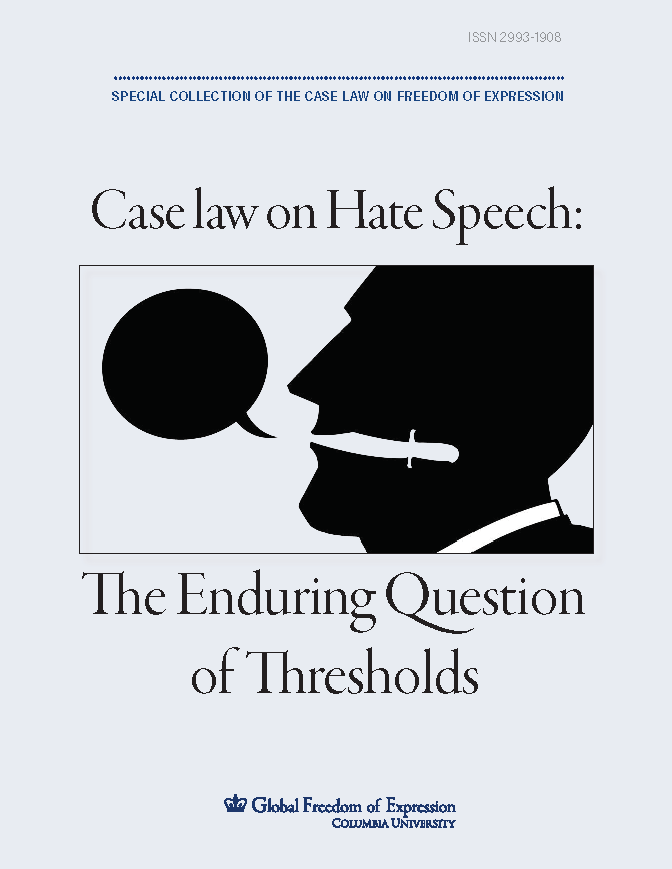
This report sets out the trends and practices across regional and international institutions in relation to their approach towards and handling of hate speech. To do so, it relies on the database of the Global Freedom of Expression initiative at Columbia University and the databases of the Future of Free Speech Project (Justitia). It aims at constituting a guide for human rights defenders, scholars, lawyers and civil society organizations as well as members of the judiciary, the legislature and policy makers by setting out international, regional and some national standards and case-law on “hate speech.” It starts off with a conceptual framework, providing different definitions and conceptualizations of hate speech by regional/international institutions and experts. After briefly setting the semantical scene of hate speech, the report provides an overview of relevant international/regional legal standards vis-à-vis hate speech. The final section of the report is a jurisprudential overview of hate speech by broadly defined themes, namely, genocide denial and antisemitism, ethnic and religious hate speech and sexual orientation.
Humor and Free Speech: A Comparative Analysis of Global Case Law
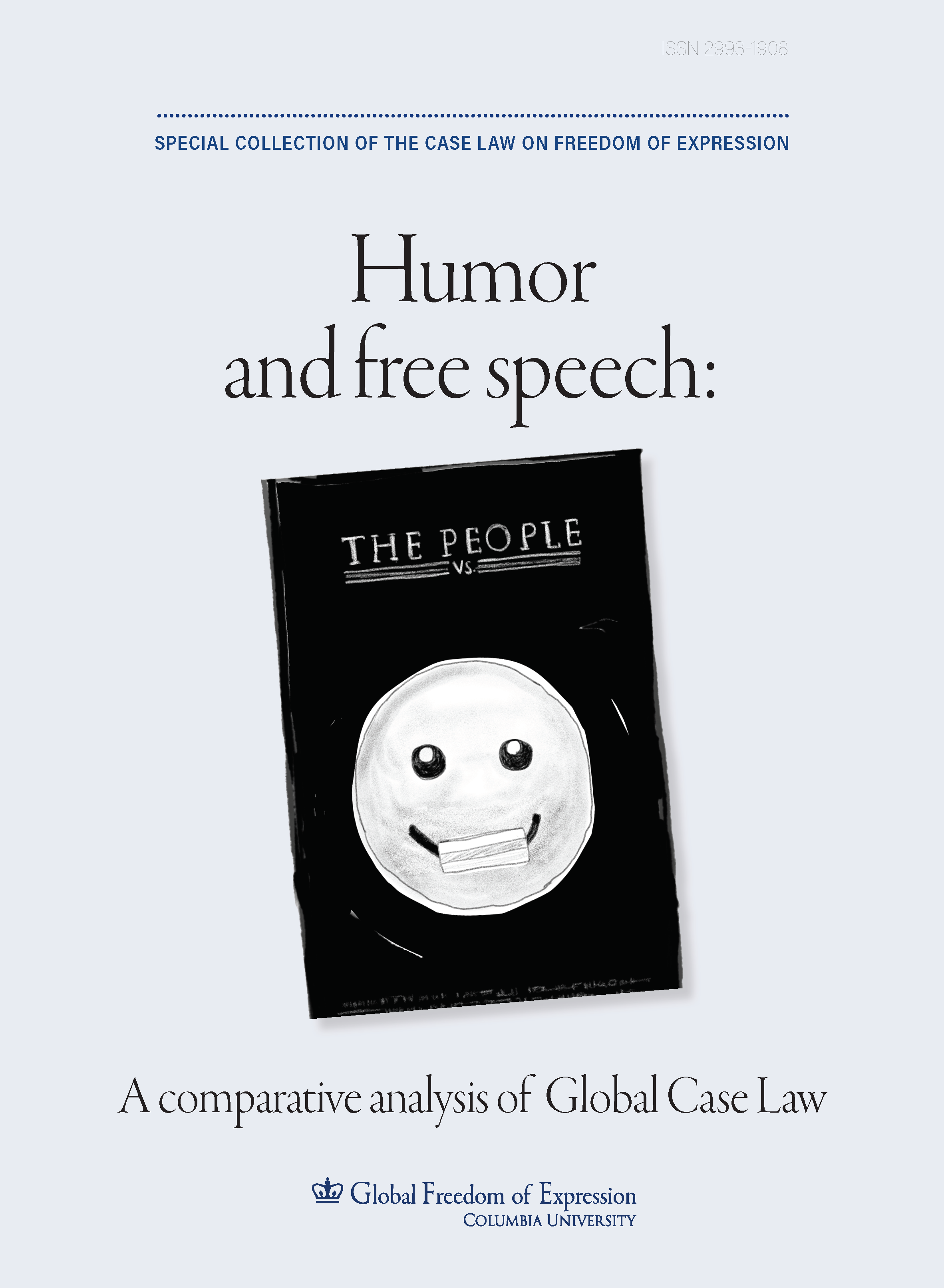
Humor is a pervasive element of human communication and a fundamental ingredient of democratic life. Throughout history, it has been used as a vehicle to poke at the powerful, engage in socio-political commentary, or collectively negotiate social boundaries and norms. As a consequence, courts from all over the world have often stressed the importance of protecting humorous expression. At the same time, the elusive and subjective nature of humor poses specific challenges for free speech adjudication. This paper will discuss international trends and recurring issues in humor-related jurisprudence, by analyzing 81 cases from across the globe. The cases are organized around five key – and sometimes intersecting – themes, namely (1) Satire, defamation and other individual dignitary harms; (2) Disparaging humor and hate speech; (3) Humor, violence and public unrest; (4) Parody, copyright and trademarks; (5) Humor and “public morals.” Building on the analyses provided in the GFoE database and on a growing body of interdisciplinary work on humor and the law, the paper also highlights the benefits of a closer dialogue between legal scholarship and practice on the one hand, and humanities-based humor research on the other.
Funding: This publication is part of the project “Humour in Court” (Principal Investigator: Dr Alberto Godioli, VI.Vidi.201.111, NWO Talent Programme Vidi SSH 2020) which is financed by the Dutch Research Council (NWO).
Please cite this paper as follows: Godioli, A. and Young, J. (2023) Humor and Free Speech: A Comparative Analysis of Global Case Law. Columbia Global Freedom of Expression, Special Collection. DOI: https://doi.org/10.5281/zenodo.8105760
Case Law on Content Moderation and Freedom of Expression
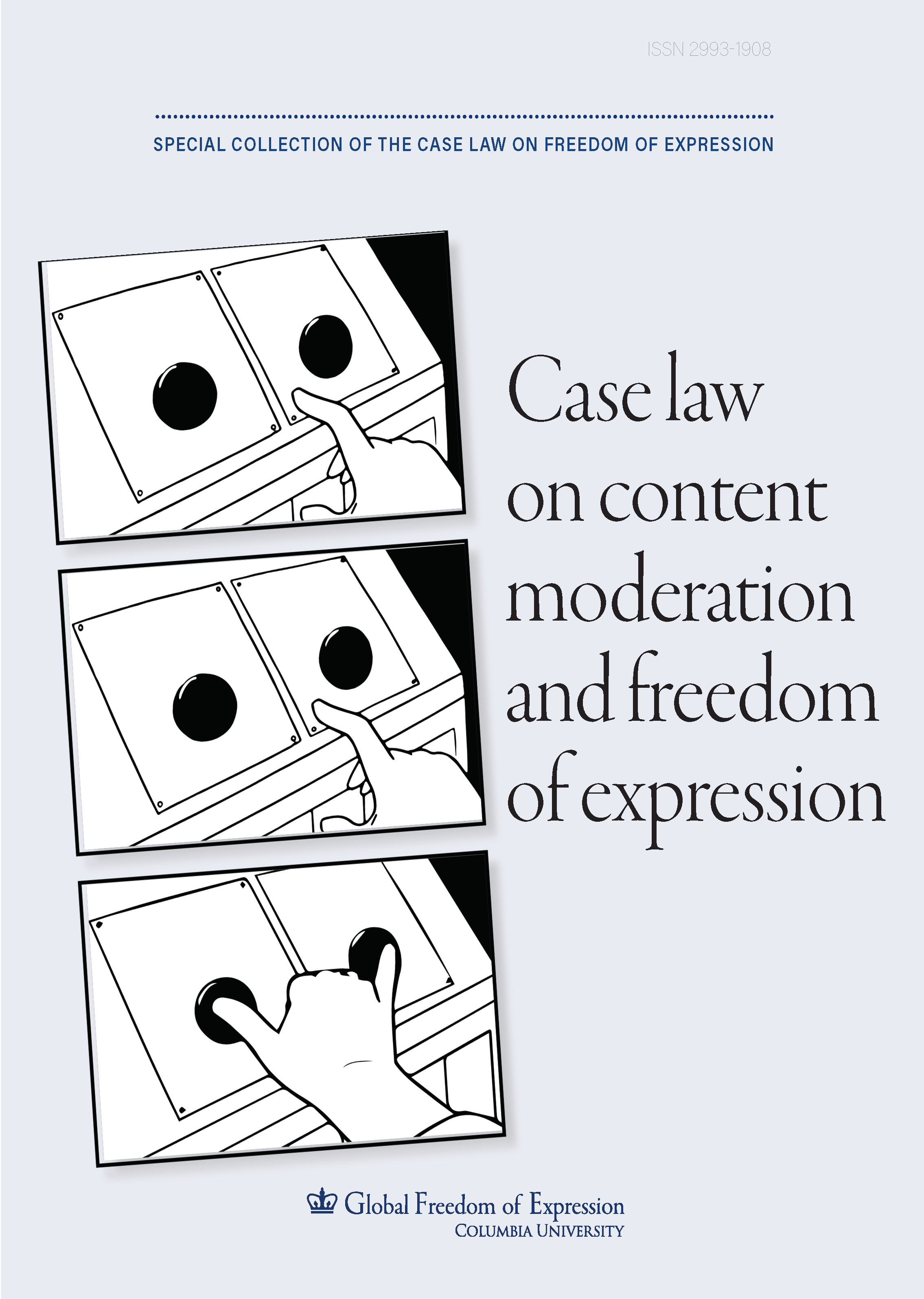
The state of freedom of expression online is substantially shaped by the moderation of content on dominant social media platforms. Their private community guidelines are the legal framework for discussions in the digital realm. Effectively, they constitute global law applying to billions of individuals, set by a few companies of the Global North. This raises fundamental questions on how to deal with private power. The answer varies substantially, depending on the legal culture: Some, in particular the United States, emphasize the principle of private autonomy, while others view it as an anti-trust problem. This paper examines the accumulation of private corporate power over freedom of speech as a human rights problem. Claimants all around the world have initiated legal actions based on the assumption that a particular act of content moderation—such as the (non-)removal of content, account suspensions or deletions, among others—, violated their human rights. The carefully chosen sample, from over 100 cases surveyed, aims to cover and contextualize the most important legal debates that courts are currently facing on this matter. The jurisprudence presented in this paper is divided into three main sections: Cases against intermediaries, cases against public officials, and cases dealing with the actions taken by states to enforce a particular kind of content moderation on private social media platforms. It also tries to showcase the different pathways taken by judicial bodies when solving these issues.
Copyright © 2022 Columbia Global Freedom of Expression, All rights reserved

